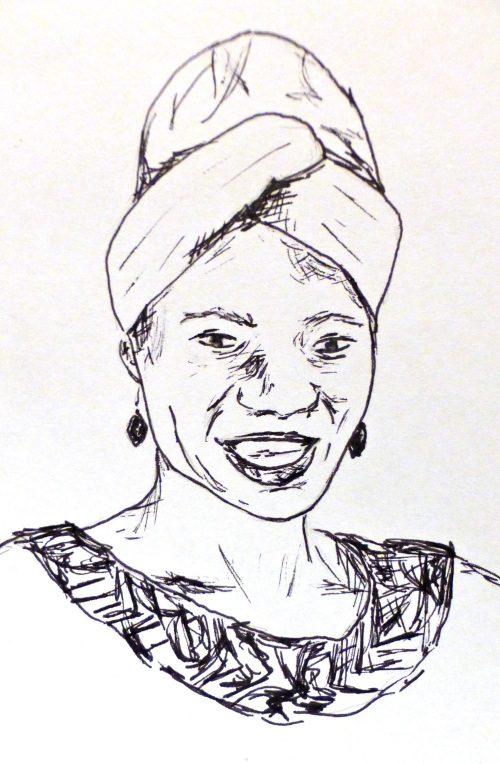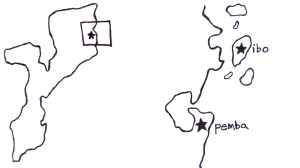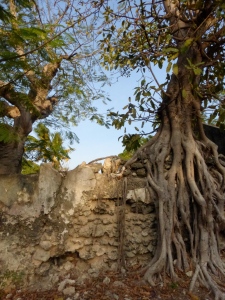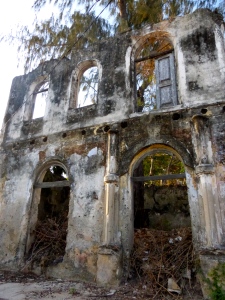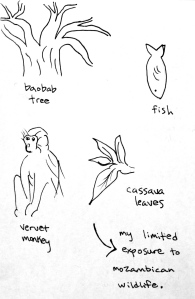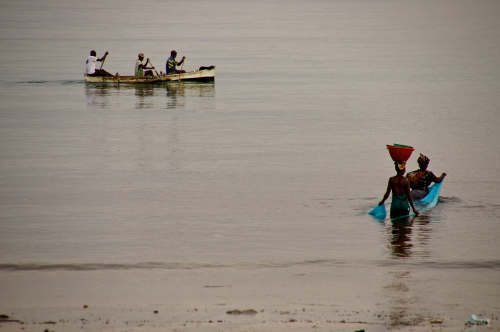
Sketches from Pemba
November 4, 2013
A Lesson in Perspective
I am often reminded through small daily incidents how different my worldview and priorities are from most Mozambicans.
Last week I was walking down the beach and one of my flip-flops kept breaking. Every two steps the straps came out of the bottom, flinging it forward into the scorching hot sand. My first thought was, well now I’m going to have to get a new pair. As I was wondering where to go to buy flip-flops and how much they would cost, a local fisherman called me over. He was sitting with a few others beside their boat, on top of a pile of nets. He asked for my flip-flop and began searching for, as he said, a piece of plastic. A bit confused, I watched as he found a ripped up plastic bag amongst the garbage scattered along the beach, and wrap it around the bottom of the sandal. He tied a few knots and showed me how the straps were now secure and would not come apart.
I was so ready to throw my sandals away, but his first instinct was to fix it, using a piece of garbage. For all the times when Mozambique can be frustrating and its inefficiencies become exhausting, it is in moments like this that I am reminded how much I can learn from its people and their perspectives.
October 24, 2013
Primero de Maio
“Even if my husband divorces me, I will not leave this group”
These are the translated lyrics of a song heard in Primero de Maio during a recent field visit. (Mozambicans seem to have a particular love of naming things – villages, streets, people – after important dates. I find this lovely but can’t quite articulate why). I was slightly anxious on the way to meet with these women, who are part of a Farmer Field School, and talk with them about their membership in the group. Past experiences, limited as they may be, had shaped my perception of women in these settings – guarded, blank stares, seemingly bored, and uninterested. Not only did it make me question what is going on their mind, but what they must think of me and how little I will ever be able to understand about their daily realities. It also made me nervous about leading a focus group… if no one talks then it kind of defeats the purpose.
The women I met in 1o de Maio, however, were not at all this image of a Mozambican woman I had formed in my mind. Instead I was greeted by laughter and smiles and, yes, song and dance. Songs about being loyal to the group despite what their husbands think. Because as it turns out, what their husbands and all men in the village think can make a huge difference to the functioning of the Farmer Field School. Distrust, for example, seems to be a huge problem not only in Primero de Maio, but in most places I have visited. Suspicions run high as soon as men and women work together in agricultural groups. This is consistently cited as a source of tension. Despite this women want men to join their groups – it lends legitimacy they would otherwise not have – but men don’t want to ‘lower themselves’ by joining a group of only women. More tension.
While there is much I don’t know about these dynamics, what has become clear quite quickly is that they play a central role in peoples lives.
October 3, 2013
Oil & Gas
Before coming to Mozambique I tried to read as widely as possible about the country – articles about its political history, novels set in its rural villages, Google news streams about the latest Renamo and Frelimo dispute, and guide books enthusiastically describing the coast.
One thing that stood out was the dominance of news regarding oil and gas companies in the northern-most province of Cabo Delgado. Everyday there was a new article about a different company – Indian, American, Chinese – that secured a portion of the reserve for millions of dollars. Since discovering gas off the coast a few years ago, the region has experienced substantial change; Pemba bay is dotted with containers, companies are building vast complexes for their employees to live, and foreign money seems to be pouring in. It’s not unusual to read about how Mozambique has one of the fastest GDP growth rates in Africa, partially due to this discovery.
Not knowing what Pemba was like prior to the gas discovery it is hard to fully appreciate how much the city is changing. I do know that the surge in expats looking for nice housing has meant huge increases in rent. It also appears that oil and gas companies strictly employ men. At least this is what it seems like, since it’s not unusual to be the only woman at any given restaurant in town. These are relatively superficial changes; I don’t feel the impacts of this shift like Mozambicans must. The thing is, it’s hard to understand just how Mozambicans are impacted. While there may be more job opportunities in Pemba, entire villages are being relocated. Is the compensation adequate? Are the high level jobs actually going to Mozambicans? Will this be a case to support the resource curse argument? I am admittedly quite ignorant on the subject (and yes, cynical as well), but being in Pemba has meant I feel compelled to learn as much as I can. Being here has also meant that these massive companies – Anadarko, Eni – now have a context. They are no longer just names in a newspaper, but companies that friends work for and entities that will change Pemba, for better or worse.
September 9, 2013
Rituals
“The modern habit of doing ceremonial things unceremoniously is no proof of humility; rather it proves the offender’s inability to forget himself in the rite, and his readiness to spoil for every one else the proper pleasure of ritual.”
– C.S. Lewis
As I once pondered with a friend of mine – why, as creatures of habit, do we consistently seek to put ourselves in unfamiliar settings? After all, my natural instinct is to create daily rituals and to revel in these familiarities. Whether it’s spending Saturday morning reading the Globe and Mail in Winnipeg, sitting at the front of the top deck of the number 30 bus in London, or always getting roasted maize from the same lady in Kampala, each brought an inexplicable sense of comfort at the time.
There is something oddly satisfying about that moment when, in a new environment, these rituals begin to form. Going to the same vendor for papaya, morning runs on the beach, that familiar route the chapa takes to and from the office each day. Even how predictable it is that things will be unpredictable. These are the familiarities that have emerged in Pemba after only a few weeks, and part of the reason it is beginning to feel like my home more each day. I’m sure these will change and new rituals will form. Perhaps they will become tedious. Or perhaps not.
August 27, 2013
Português
My deep desire to know a second language and my actual ability to string together two sentences in any other language has always been disproportionate. Not for lack of trying. I can honestly say that I have tried to learn French, and not so honestly that I have tried to learn Swahili.
But now my thoughts are consumed by one thing – Portuguese. I cannot stop thinking about Portuguese.
Segunda-feira, terça-feira…
Quarenta, cinquenta, sessenta…
Alface, cebola, amendoim, peixe…
Eu fui, ele foi… vamos, vemos, vimos…
Since arriving in Mozambique it has become clear that not only do I truly want to learn, I actually really do need to learn. I can’t help but feel an intense embarrassment each day when all I can offer is a blank stare, when I can’t partake in conversations, and when my lack of Portuguese is a real hindrance.
I want to learn so badly sometimes I daydream that desire equals knowledge. Unfortunately I have so far found this to be untrue. Instead it seems to equal frustration, disappointment, and uncertainty. Until that day when I can truly have a conversation, I will continue to plan ahead everything I say, recite my memory cues, and face the inevitable awkwardness head on.
Eu só posso esperar que o ajuda e fica mais fácil.
August 24, 2013
Ibo
My guidebook tells me that Ibo Island is one of southern Africa’s best-kept travel secrets. It also tells me that access is not exactly straightforward. Both prove to be true during this past week’s work trip to the island. A long bumpy car ride led us to a waterfront where tourists and locals alike wait for the tide to be high enough to cross. We all wait together, and when it comes time we wade into the water to climb aboard our boats, us into our motorboat and them into a seemingly homemade sailboat.
The island’s colonial era buildings, once a symbol of Portugal’s power, have long since faded and crumbled. Nature has begun to take over, as roots and vines intertwine with the Swahili and Arabic architecture. Empty Rhino Gin bottles litter the streets. Despite being peak tourist season, the town centre is eerily quiet and the roads are empty. In three days I see one car.
As we walk through the sandy roads, however, into preschools, artisan workshops, and adult literacy classes, it is clear there is more to Ibo than it’s past. I may just be a visitor but I’m thankful for the opportunity to get a glimpse into the life of Ibo’s residents.
August 17, 2013
Baobab tree: Leafless baobab trees line the main road into Pemba. With their oversized trunks and spindly branches, they seem mystical and otherworldly, like something from a fairytale.
Fish: I won’t even pretend to know what kind of fish there are here, but I know they are important. In the mornings men work together to pull them onto the beach in their nets, and boys sell them on the side of the road.
Vervet monkey: Frequently seen at the Aga Khan offices. Maybe they are fooling others into thinking they are cute, but I know better. Owing to (what I believe is) a healthy fear of monkeys, our door gets closed each time they saunter by.
Cassava leaves: Cooked cassava leaves are the basis for matapa, a traditional Mozambican dish. Made with coconut milk and nuts, it is delicious. It is, however, hard to find in restaurants and so my mission is now clear. Find more matapa.
August 13, 2013
Sunday in Wimbe
During an early morning run, Wimbe beach is peaceful and calm. The air feels dense with the smell of salt, and the horizon is misty as the day’s heat has not quite broken through. Less than twenty-four hours earlier and the scene could not have been more different. For yesterday was Sunday. And Sunday is when Wimbe seems to come alive. By mid afternoon the beach is full; the soccer games are rowdy, the music is blaring, kids gleefully splash in the water, and tourists enjoy the beach patios.
I seem to go through waves of hyper self-awareness and absentmindedness. One moment I am engrossed in my book and soaking in the sun, almost forgetting that I am halfway across the world from family and friends. And then suddenly I am jolted into reality as I become aware of how little I can blend in (made clear by the calls of persistent men), how I cannot understand the language, and how I really don’t know how anything here works.
The temptation is to only see the picturesque beaches and to only stay on those patios. Instead I aim to embrace and seek out the uncomfortable, that which makes me anxious due to its unfamiliarity. I can’t say I’ll always succeed, but… one day at a time, I suppose.
